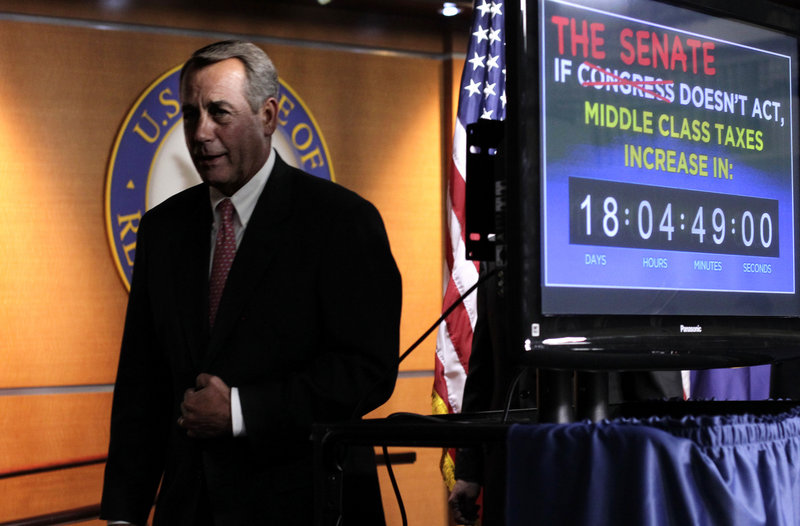WASHINGTON — A partisan standoff in Congress over President Obama’s payroll tax cut for 160 million working Americans threatens to shut down the federal government as soon as this weekend, leaving lawmakers to finish the year careening toward yet another budget crisis.
A must-pass bill to keep the government running has become tangled in the politics of continuing the payroll tax break, which would shave workers’ Social Security tax from 6.2 percent to 4.2 percent. If the tax cut is allowed to lapse after Dec. 31, workers would have to pay an extra $1,000 a year, on average.
Senate Majority Leader Harry Reid, D-Nev., and other Democrats met Wednesday with Obama at the White House as House Speaker John A. Boehner, R-Ohio, convened rank-and-file Republicans in private, with both sides searching for a solution.
Democrats are considering dropping their plan to impose a surtax on millionaires to pay for the payroll tax holiday — a concession that had been considered likely. Republicans had rejected the proposal, so if Democrats retreat, the contours of a compromise could begin to emerge. The GOP wants the $120 billion cost of the payroll tax break to be covered mainly by cuts, including reducing unemployment benefits and freezing federal workers’ pay.
An aide familiar with the White House talks said the millionaires surtax is up in the air. “It’s being discussed,” the aide said.
The stalemate hardened this week as the GOP-led House approved a package that keeps the payroll tax holiday for 2012, but loaded the bill with Republican priorities — including a provision to allow drug tests for recipients of unemployment benefits, and another to roll back clean-air standards for industrial boilers that emit mercury. Those provisions make the bill dead on arrival in the Senate, where Democrats hold the majority.
Boehner tacked extras onto the bill to gain support from resistant Republicans, who dispute mainstream economists’ assurances that the payroll tax break stimulates the economy. Conservatives also doubt that losses in the Social Security trust fund will be replenished with offsetting money.
To apply leverage and prevent the House from heading home for the holidays, Democrats are stalling an unrelated spending bill to keep the government running. They say it contains unresolved side issues.
Boehner told reporters late Wednesday that the House had acted to extend the tax cut, and now it was the Senate’s turn.
“I’m tired of hearing what the Senate can’t do,” he said. “I think it’s time for us to wait and see what the Senate can do.”
Federal workers are preparing for a shutdown, saying they would have to go without pay over the holidays. Boehner is seeking to avoid blame by pushing a version of the funding bill through the House by Friday, when most government offices would run out of money.
In a written statement late Wednesday, White House Communications Director Dan Pfeiffer said the administration wants Congress to approve a short-term spending measure to avoid a federal shutdown and give lawmakers time to iron out their final disputes.
But negotiations over the payroll tax compromise have far to go. One of the add-ons, a provision to accelerate development of the controversial Keystone XL oil pipeline, has been singled out by Obama as a reason to reject the bill — although the White House declined to mention the pipeline in its most recent veto message, a signal that the administration may be loosening its position. Republicans view the pipeline from Canada to the Gulf of Mexico as a “jobs creator,” but critics say it will increase the nation’s carbon footprint and pollution. Obama had shelved a decision until after the 2012 election.
If the dispute did result in a government shutdown, not all agencies and departments would be affected, thanks to a partial spending bill passed in November. The departments of Agriculture, Commerce, Housing and Urban Development, Justice, State and Transportation, as well as NASA and some other smaller agencies, would be spared.
But much of the government would be shuttered. National parks would close, for instance, and processing of some passports would cease.
The showdown marks the fourth time this year that congressional disputes have dragged the government to the brink of a partial shutdown.
Behind the white-hot rhetoric of their leaders, many rank-and-file lawmakers continued to predict that a last-minute compromise would extend the tax cut and prevent a shutdown. A number wearily said that the only casualty of the fight would be Congress’ already battered reputation.
“It’s all going to get passed eventually,” said Sen. Tom Coburn, R-Okla. “But the political maneuvering is sickening.”
The Washington Post and The Associated Press contributed to this story
Copy the Story Link
Send questions/comments to the editors.



Success. Please wait for the page to reload. If the page does not reload within 5 seconds, please refresh the page.
Enter your email and password to access comments.
Hi, to comment on stories you must . This profile is in addition to your subscription and website login.
Already have a commenting profile? .
Invalid username/password.
Please check your email to confirm and complete your registration.
Only subscribers are eligible to post comments. Please subscribe or login first for digital access. Here’s why.
Use the form below to reset your password. When you've submitted your account email, we will send an email with a reset code.